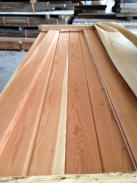
800-799-3237










© Ryan Wholesale, Inc 1995-2015
Made with Xara
Ryan Wholesale, Inc
T&G ceilings and Patterns - What You Need to Know
Tongue & Groove 1” and 2” lumber can be a great way to finish out a room or an
outdoor living area. Here are some tips that can really help you save money and get
the look that you want.
•
When to use 2x6 T&G
o
2x6 T&G in either Douglas Fir or Southern Pine typically comes in 3 grades:
▪
#2, #1, (Yellow Pine and Fir), & “D” grade (Fir)
o
Any of these grades can carry typical roof loading over approximately a 7½’
free-span. This means that you can put these products directly over your
timber framing providing both the roof decking and a finished T&G wood
ceiling. There can be significant savings and simplicity of framing by
employing 2x6 T&G in appropriate cases.
o
A good quality #2 2x6 can cost 30% less than a “D” grade 1x6 T&G. Combined with the savings
on framing, you can see how this could easily save on your project.
•
Picking the right species of 1x6 for your project:
o
This is mostly a matter of personal choice based on appearance, because most of the products
available in 1x6 T&G are roughly the same price (within 10-15% of each other)
▪
1x6 STK (Standard Tight Knot Cedar) - Many visible, tight knots
▪
1x6 “D” Grade Southern Pine - Virtually clear of any knots and defects
▪
1x6 “D” Grade Douglas Fir - Virtually clear of any knots and defects
▪
1x6 #2 Common Cypress - Moderate number of mostly tight knots
o
Stability (shrinkage, cupping, crook, twist)
▪
Most shrinkage issues are due to improper Kiln Drying, which is essential for a T&G product
▪
Of the 4 species mentioned above, Cypress is the most difficult to dry, and thus has a higher
incidence of shrinkage issues. We are very careful about the Cypress mills we purchase
from, making sure that the drying process is thorough.
▪
Yellow pine has a greater tendency to have crook and twist
▪
Douglas Fir and Western Red Cedar tend to be the most stable, with Fir offering better nail
holding ability.
o
Higher grades are available in most of these species, but the cost will more than double 1n most
cases with .


800-799-3237





© Ryan Wholesale, Inc 1995-2015
Ryan Wholesale, Inc
T&G ceilings and Patterns - What You Need to Know
Tongue & Groove 1” and 2” lumber can be a great way to finish out a room or an
outdoor living area. Here are some tips that can really help you save money and get
the look that you want.
•
When to use 2x6 T&G
o
2x6 T&G in either Douglas Fir or Southern Pine typically comes in 3 grades:
▪
#2, #1, (Yellow Pine and Fir), & “D” grade (Fir)
o
Any of these grades can carry typical roof loading over approximately a 7½’
free-span. This means that you can put these products directly over your
timber framing providing both the roof decking and a finished T&G wood
ceiling. There can be significant savings and simplicity of framing by
employing 2x6 T&G in appropriate cases.
o
A good quality #2 2x6 can cost 30% less than a “D” grade 1x6 T&G. Combined with the savings
on framing, you can see how this could easily save on your project.
•
Picking the right species of 1x6 for your project:
o
This is mostly a matter of personal choice based on appearance, because most of the products
available in 1x6 T&G are roughly the same price (within 10-15% of each other)
▪
1x6 STK (Standard Tight Knot Cedar) - Many visible, tight knots
▪
1x6 “D” Grade Southern Pine - Virtually clear of any knots and defects
▪
1x6 “D” Grade Douglas Fir - Virtually clear of any knots and defects
▪
1x6 #2 Common Cypress - Moderate number of mostly tight knots
o
Stability (shrinkage, cupping, crook, twist)
▪
Most shrinkage issues are due to improper Kiln Drying, which is essential for a T&G product
▪
Of the 4 species mentioned above, Cypress is the most difficult to dry, and thus has a higher
incidence of shrinkage issues. We are very careful about the Cypress mills we purchase
from, making sure that the drying process is thorough.
▪
Yellow pine has a greater tendency to have crook and twist
▪
Douglas Fir and Western Red Cedar tend to be the most stable, with Fir offering better nail
holding ability.
o
Higher grades are available in most of these species, but the cost will more than double 1n most
cases with .













